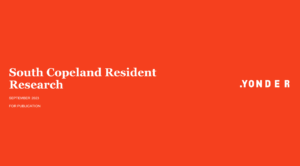In June 2023, independent research consultant Yonder oversaw a survey of 187 adult residents who were interviewed in person across the wards of Millom and Millom Without – the Search Area for a Geological Disposal Facility (GDF) in South Copeland. This survey was part of a programme of continued surveys looking at local people’s awareness, understanding and support of a GDF across the Search Area, and helps to inform the Community Partnership’s approach and activities.
Earlier this year, in April 2023, the Search Area for South Copeland changed its boundary due to Local Government Reorganisation. Drigg and Carleton, and Irton with Santon, which were previously a part of the Mid Copeland Search Area, now sit in the Millom Without ward and are instead in the South Copeland Search Area. The Community Partnership requested for a distinction between the previous and current Search Area to be identified in the results.
We asked Yonder to summarise the results, and the Chair of South Copeland GDF Community Partnership, Ged McGrath, to provide his view on the findings.
Summary
The results of the survey showed that residents remained engaged with the subject matter. Over half (57%) recalled seeing, reading or hearing something about radioactive waste or geological disposal in the past year.
42% of residents surveyed attributed their awareness of the subject matter to a leaflet or newsletter in the post. When prompted, two-in-five (39%) claimed that they had seen and read the South Copeland GDF Community Partnership newsletter and 17% claimed to have seen the newsletter but not read it. Of those that claimed to have seen and read the newsletter, a majority (81%) agreed that it was easy to understand and 69% agreed that it was informative.
Though engaged, respondents’ awareness of how radioactive waste was managed was more limited. 37% were aware of the UK’s current storage method for its radioactive waste (stored at interim surface or ground-level storage facilities at sites across the UK). One-in-five (20%) believed it was held in vaults deep underground in the UK, and a third (35%) admitted that they did not know.
Some residents’ understanding of geological disposal was also limited. One-in-five (19%) were able to identify the accurate description of a Geological Disposal Facility (GDF). One-in-three (34%) had heard of the term but knew nothing of it. 12% thought they were deep underground facilities that were currently used in the UK for the permanent disposal of radioactive waste, whilst 14% thought that they were near-tosurface sites where the UK currently buries low-level radioactive waste.
When considering the construction of a GDF in the South Copeland Search Area, one-in-four (27%) opposed it and 39% were supportive. One-in-three (32%) were neutral towards a proposed GDF within the South Copeland Search Area.
Appetite for information about geological disposal and the siting process remained high. Respondents most often requested general information about the approach / geological disposal (34%). One-in-five (22%) wanted information relating to the location of the Search Area or the potential site, whilst 19% wanted information on safety. Half of those surveyed wanted to receive information via post. 15% wanted information via in-person meetings / events and 14% cited Facebook. One-in-five (20%) said that they did not want to receive any information.
These community survey results and the previous community survey results in 2022 are compared in the full report below. In addition, the results are broken down to show the impact of the new Search Area additions, Drigg and Carleton and Irton and Santon, which were minimal.
Reaction of the Chair of South Copeland GDF Community Partnership, Ged McGrath:
“This research provides another insight into residents’ awareness and understanding of the South Copeland GDF Community Partnership and their views on geological disposal.
“In April 2023 the South Copeland Search Area changed due to Local Government Reorganisation, and interestingly, the results of this survey were largely the same when comparing its data from the former Search Area with the revised Search Area, which incorporates Drigg and Carleton, and Irton and Santon.
“There are, however, some noticeable differences between the results of this survey and the previous survey in 2022, and it’s clear that more regular surveying will provide further information about the community’s opinions and information needs. We now plan to survey local residents more frequently, hopefully with another round of research in November.
“It’s important to note that we’re in the early stages of engaging with local people on this subject. We’re listening to everyone’s views and information needs, and we will continue to do so, having many conversations, gaining feedback and providing answers, so that the community can make an informed decision.
“If a suitable site is found in South Copeland – a decision which could take 10-15 years – a Test of Public Support would ensure the local community decides whether or not they want a GDF in the area. That’s why it’s really important that we, as a Partnership, understand local people’s feelings and requirements so that we can best serve you in this process.”
Methodological statement
Between 6 and 14 June 2023, Yonder oversaw a survey of 187 adult residents who were interviewed in person across the wards of Millom and Millom Without. Quotas were employed to ensure the resident sample was representative of the relative populations of the two wards. The way the survey was designed means that 187 people’s views were representative of the wider population. Quotas and weights were employed to ensure the random sample was representative in terms of the relative populations of the two wards and the age and sex profiles of the area in question. With a sample of 187 and a 95% confidence interval, a +/-7% margin of error is expected, so this gives a good indication of views across the Search Area which is roughly comparable with similar research conducted in 2022.
The change to the South Copeland Search Area following Local Government Reorganisation meant that residents in Drigg and Carleton and Irton with Santon (who were previously in the Mid Copeland Search Area) were included in the research.
Yonder is a member of the British Polling Council and abides by its rules. Yonder was formerly known as Populus and changed trading names in October 2020. For more information, see www.yonderconsulting.com.


